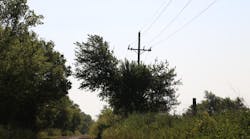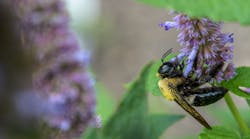The University of New Hampshire is launching a study supported by a $51,355 grant from Public Service of New Hampshire. The study will be conducted by Matt Tarr, UNH Professor and Wildlife Specialist, and will analyze the effects of invasive shrubs on insects and songbird populations in power line corridors.
“Shrubland habitats are an incredibly important part of our environment that support dozens of species of birds, mammals, reptiles, and amphibians” said Tarr. “In New Hampshire, power line corridors function as a critical source of shrubland habitats. This study will analyze the impact of invasive shrubs on these habitats and what impact they are having on the populations of wildlife that inhabit them.”
The three-year study will commence in 2012. The UNH Cooperative Extension will launch a website next spring to provide regular updates on the study.
At several study sites, Professor Tarr and his field technicians will catch, tag, and map the territory of common yellowthroats birds using GPS technology to determine where the birds sing, feed, and nest. Common yellowthroats were chosen because they are among the most sensitive birds to changes in shrubland habitats. Power line corridors wider than 160 feet and approximately 10 acres in size will be considered for study sites.
“Power line corridors, especially those over 160 feet wide, are ideal shrubland habitats and are stable and predictable habitats for many species,” said Tarr.
The funding provided by PSNH will be used to leverage an additional $130,000 in support from a variety of sources. “As a company, PSNH always strives to be a responsible steward of the environment,” said Gary Long, PSNH president and chief operating officer. “This study will not only provide an opportunity to better understand shrubland habitats, but also will aid PSNH in developing effective vegetation management strategies that will benefit both power line corridors and wildlife that inhabits them. We are pleased to support this study and look forward to the results.”

